Len Gutman's Blog, page 22
June 28, 2011
Cloud Atlas an Epic Masterpiece of a Novel
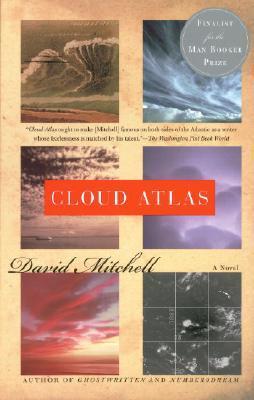 Imaginative. Ambitious. Rich. Enthralling. These are just a few of the adjectives that pop into my mind when I think of Cloud Atlas, the David Mitchell novel from 2004 that I completed last night. Cloud Atlas is so interesting and unique I'm not even sure how to describe it, but in a nutshell it's a series of stories that span a huge swath of time from the past to the present and far into the future that are loosely interconnected and when put together tells the story of what mankind's future might hold if we do not veer from our course of corporate control of politics and everything else. I said it was ambitious!
Imaginative. Ambitious. Rich. Enthralling. These are just a few of the adjectives that pop into my mind when I think of Cloud Atlas, the David Mitchell novel from 2004 that I completed last night. Cloud Atlas is so interesting and unique I'm not even sure how to describe it, but in a nutshell it's a series of stories that span a huge swath of time from the past to the present and far into the future that are loosely interconnected and when put together tells the story of what mankind's future might hold if we do not veer from our course of corporate control of politics and everything else. I said it was ambitious!
The story begins with the tale of a 19th century American writer on a journey in the South Pacific, reaches a pivotal point in the distant future where mankind has experienced a "fall" back to his hunter and gatherer ways, and then abruptly does an about-face and journeys back to the beginning. Each story is interesting enough to hold the reader's attention, but when put together the novel is a strange and exotic journey itself. I wasn't sure what to think when I began reading the novel, and when the first twist came I was quite confused but continued on, and after a while I figured out Mitchell's strategy but still had no idea where he was taking me or where I would end up. It was such a fun read.
I'm not going to delve into the plot, but I will say the novel was superbly written and the characters were robust and each was unique. Mitchell is a glorious writer with a fabulous imagination. I'm not usually one for literary gimmicks (I thought Jennifer Egan's Pulitzer-winning A Visit from the Goon Squad relied too heavily on its gimmick), but the way Mitchell tied these stories together was quite brilliant. Again, I don't want to give anything away because I encourage you to read this book — but I will say each story leads into the next with just a hint of connection. The novel is pretty complicated a have to admit. At times you can lose track of characters and relationships, especially since just when you get used to a character Mitchell switches things up and changes stories. I would have loved a character map, or perhaps I will simply read it again and keep notes.
I highly recommend Cloud Atlas. And you should definitely read it before Fall 2012 so you can be well prepared for the film which stars Tom Hanks and Halle Berry amongst others.
Filed under: Books








June 27, 2011
AFI #89: The Sixth Sense
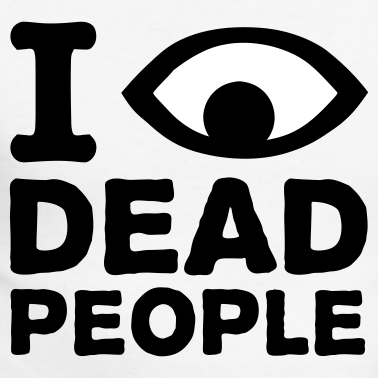 I watched The Sixth Sense a few month's ago with my son, so no need to watch it again for this blog. I had seen it before, and frankly I didn't really want to see it again because once you know the ending it's not much of a film, but Connor hadn't seen it and we thought he'd like it. Well, he had the same reaction as I did the first time I saw it — "eh."
I watched The Sixth Sense a few month's ago with my son, so no need to watch it again for this blog. I had seen it before, and frankly I didn't really want to see it again because once you know the ending it's not much of a film, but Connor hadn't seen it and we thought he'd like it. Well, he had the same reaction as I did the first time I saw it — "eh."
Let's be honest, were it not for the ending, which I will not disclose here for the three of you out there who haven't seen this film, it would have been a rather typical mystery movie. I don't think The Sixth Sense belongs on this list. Believe me, if you "love" The Sixth Sense it's probably because you haven't seen it again since being shocked by the ending. It's a gimmick film, and it should have tipped us off to just how overrated M. Night Shayamalan really is. After this he did the forgettable Unbreakable, followed by the moronic Signs and a several more unwatchable films. Can you say over-hype?
There is one worthwhile thing beyond the plot twist at the end, and that is the superb acting of young Haley Joel Osment. After playing Forrest Gump's kid he did a bunch of TV before breaking out in this film, and then he followed this up with a bunch of great performances in films like Pay it Forward and Artificial Intelligence. He has the creepy kid thing down.
Next up: Bringing Up Baby
Filed under: AFI Top 100








June 26, 2011
AFI #90: Swing Time
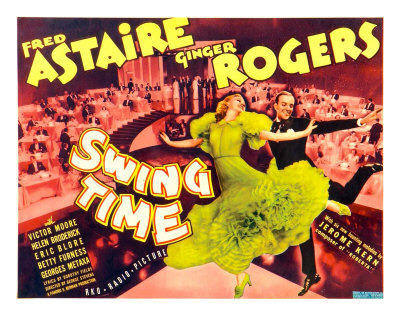 Right off the bat I should say I'm not a big fan of musicals, and I'm definitely not a fan of dance movies. Swing Time (1936) is a musical dance movie, so it pretty much had two strikes going in for me. Don't get me wrong, some of my favorite films are classics (Casablanca, The Philadelphia Story). However, the whole musical thing doesn't do much for me — old or new (I didn't care for Moulin Rouge and I don't care to see Chicago). I had an old girlfriend in college who loved musicals so I've seen plenty of them, and some of them I really liked (An American in Paris, The Sound of Music), but I can't say I enjoyed Swing Time.
Right off the bat I should say I'm not a big fan of musicals, and I'm definitely not a fan of dance movies. Swing Time (1936) is a musical dance movie, so it pretty much had two strikes going in for me. Don't get me wrong, some of my favorite films are classics (Casablanca, The Philadelphia Story). However, the whole musical thing doesn't do much for me — old or new (I didn't care for Moulin Rouge and I don't care to see Chicago). I had an old girlfriend in college who loved musicals so I've seen plenty of them, and some of them I really liked (An American in Paris, The Sound of Music), but I can't say I enjoyed Swing Time.
Swing Time is the story of Lucky Garnett (Fred Astaire), a dancer with a gambling problem, who goes to New York to earn enough money to return to his hometown and marry his sweetheart. Unfortunately, or fortunately, once in New York he meets and falls for fellow dancer Penny Carroll (Ginger Rogers). I had never seen a Fred Astaire/Ginger Rogers film so I'm glad I finally checked that off my list, although I had seen other Fred Astaire films including Band Wagon with the gorgeous Cyd Charisse (best legs of all time)! These films all follow a simple formula where boy meets girl, boy loses girl, boy wins back girl and in between there is dancing and singing. If you like that sort of thing you'll probably like Swing Time.
I read several reviews of Swing Time prior to watching it and they all said it was the best of the Astaire/Rogers films, which doesn't say much in my opinion. This one was cute, and a little corny, but overall a tad boring. And on top of that, it featured a huge musical number with Astaire dressed in black face which I couldn't get past even though it was made in 1936. It's just wrong no matter when it was done.
On the bright side, there are only a handful of musicals on the entire AFI list including The Sound of Music, West Side Story and Singin' in the Rain so I won't have to suffer much more through this dated genre.
Next up: The Sixth Sense
Filed under: AFI Top 100








June 25, 2011
'Super 8′ this Generation's 'Stand By Me'
 Great coming of age films are few and far between, but for guys my age one of the best has to be Rob Reiner's Stand By Me featuring Corey Feldman, Wil Wheaton, River Phoenix and Jerry O'Connell. The Steven King story is about a couple of boys who go on an adventure in search of a dead body, but it's really more about the journey than the destination. Stand By Me is a classic.
Great coming of age films are few and far between, but for guys my age one of the best has to be Rob Reiner's Stand By Me featuring Corey Feldman, Wil Wheaton, River Phoenix and Jerry O'Connell. The Steven King story is about a couple of boys who go on an adventure in search of a dead body, but it's really more about the journey than the destination. Stand By Me is a classic.
Super 8 has the same feel. It's the story of a group of middle school kids who accidentally stumble upon a huge Air Force cover up while making a homemade zombie movie on their Super 8 camera. But like Stand By Me the plot is secondary to the maturation process we witness as these boys learn what it's like to experience adult issues. And also like Stand By Me, the best parts of the film are the conversations between the characters. Who can forget the great debate in Stand By Me about Goofy? "Mickey is a mouse…Donald is a duck…Pluto is a dog…what the hell is Goofy?"
The boys in Super 8 are all experiencing their own issues — the key one being Joe Lamb who is reeling from the loss of his mother and a "distant" father. His new relationship with popular girl Alice (Elle Fanning) is wonderful and turns out to play a key role in two major aspects of the story. These two young actors in particular were brilliant and believable and I suspect we'll be seeing much more from both of them in the future.
The relationships in the film are so interesting that we almost forget that this is an action-packed thriller from writer/director J.J. Abrams (Lost, Cloverfield, Star Trek, Mission Impossible II). The action is awesome and the effects are super. It has a Transformers feel with a little Alien and E.T. thrown in. And of course the E.T. feel comes directly from Super 8′s producer Steven Spielberg. It's hard not to compare Super 8 to E.T., but aside from some plot similarities it's really the mood of the film that is pure Spielberg. The film is set in 1979 in a small Ohio town and little references and images make the period feel real (mentions of Walkmans and Rubik's Cubes for example). These kids are just like we were growing up in the 70s — Spielberg/Abrams really delivered on that. Plus the kids were all interesting and probably like your own pack of friends there was a goofy kid and a fat kid and a kid who was afraid of everything. Perhaps the best relationship (the one between Alice and Joe) was the one that hit home for me as there was a credible awkwardness between them. 12 year old boys and girls are strange beasts to each other…they repel and attract at the same time. Alice's entrance into this boys world captured that awkwardness so well.
I think Super 8 is a great family movie — one of the best in many years. It definitely might be a little scary for young kids, but for a 13-year-old like my son it is a home run. But even if you don't have a tween or young teen but you liked Stand By Me, go see Super 8. You'll love it.
Filed under: Film








June 20, 2011
AFI #91: Sophie's Choice
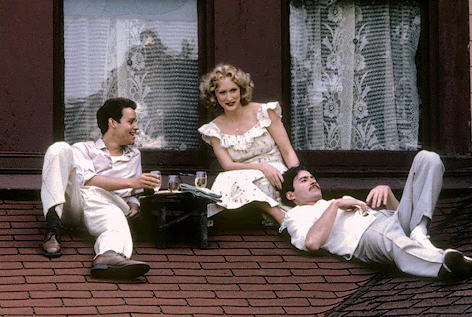 Sophie's Choice was one of the films on the AFI list I wasn't overly excited about seeing again. To begin with, I'd seen it. But I also have a hard time watching Holocaust-related films because when you grow up Jewish you pretty much have to see it all — from Hollywood films to documentaries to short films about butterflies (my MOT friends who went to Hebrew School will get this reference). But then I started watching Sophie's Choice yesterday and I was immediately drawn in to this amazing film.
Sophie's Choice was one of the films on the AFI list I wasn't overly excited about seeing again. To begin with, I'd seen it. But I also have a hard time watching Holocaust-related films because when you grow up Jewish you pretty much have to see it all — from Hollywood films to documentaries to short films about butterflies (my MOT friends who went to Hebrew School will get this reference). But then I started watching Sophie's Choice yesterday and I was immediately drawn in to this amazing film.
All discussion of Sophie's Choice must begin and end with Meryl Streep. Say what you want about Streep, but it's no accident she has been nominated for 16 Academy Awards. She won her second "Best Actress" award for her role as Sophie, and frankly I'm not sure how an actress can perform any better. I didn't think for one second that she wasn't a Polish immigrant in this film…she was astonishing.
Sophie's Choice is an actor's film, by which I mean the three leading roles carry the action throughout and the film is entirely dependent on those performances. I suspect Streep knew what she was getting into when Alan Pakula cast her, but lost in Streep's magnificence were two wonderful performances by Kevin Kline and Peter MacNicol. Sophie's Choice marked the feature film debut for Kline and his work as Sophie's "mad lover" Nathan was very memorable and clearly indicative of things to come for this Oscar winner. And then there was Peter MacNicol in only his second film, playing "narrator" Stingo. MacNicol never did turn into a great film star, but he has won a handful of Emmy Awards for great performances in a whole host of TV shows from Ally McBeal to 24 and Grey's Anatomy. This acting ensemble was fabulous and it's quite remarkable that the film didn't even get nominated for a Best Picture Oscar.
That year's Academy Award for Best Picture went to Ghandi, which was a great film but did not even make the AFI Top 100. Also nominated that year were two films that did make the AFI list (Tootsie and E.T.) along with The Missing and The Verdict. Sophie's Choice certainly deserved to be nominated…it did get nominated for the Golden Globe.
Sophie's Choice is definitely worth seeing again if you haven't seen it in a while. Most people know it because of the horrific "choice" itself that Sophie had to make at her arrival at Auschwitz, but it's so much more than that. It is funny at times, and heartwarming, but ultimately it's a tale of man's inhumanity to man and how difficult "recovery" can be. It's also a commentary on madness (the Nazi kind and the kind that afflicts everyday people like Nathan). I was glued to the screen this time around and really, really loved Sophie's Choice.
Next up: AFI #90 Swing Time
Filed under: AFI Top 100, Film








June 6, 2011
AFI #92: Goodfellas
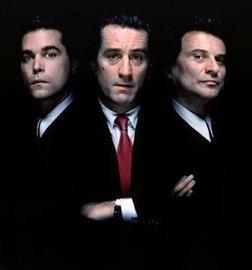 "Jimmy was the kind of guy that rooted for bad guys in the movies." — Henry Hill
"Jimmy was the kind of guy that rooted for bad guys in the movies." — Henry Hill
What is it about mob movies that we enjoy so much? Is it the gratuitous violence? Is it the men with no fear? Is it the stories? I'm really not sure, but I do know I love a good gangster tale. That being said, there are only a few mob films that I'd consider great…and Goodfellas is definitely one of them.
Back to Goodfellas in a moment, but first I should mention those great mob films. The Godfather saga is of course, without question, head and shoulders above the rest as we'll learn much further ahead on the AFI list. A Bronx Tale is one of my favorites (is it better to be feared or to be loved?). Once Upon a Time in America makes the cut. Casino. Hmm, all of these flicks have one thing in common — Bobby De Niro! Maybe that's what makes a good mob flick.
Goodfellas is a great mob film. It has all the ingredients. Violence. Made guys with funny names. The "F" word. De Niro. But really what makes Goodfellas so compelling is that it's a true story. De Niro's Jimmy Conway actually whacked all those people. Joe Pesci's Tommy De Vito was a real sociopath. And Henry Hill turned state's evidence on all of them and left for the witness protection program. Goodfellas, like most mob films, doesn't have a happy ending. Maybe what we love about mob films is that the bad guys always get what's coming to them in the end? Nah! We like the violence!
We also like the humor. Is there a funnier mobster than Tommy De Vito? Here's an epic exchange after Tommy "accidentally" shoots Spider (Michael Imperioli) for telling him to fuck off and Jimmy eggs him on about not letting Spider get away with it:
Jimmy Conway: What's the fuckin' matter with you? What – what is the fuckin' matter with you? What are you, stupid or what Tommy, Tommy, I'm kidding with you. What the fuck are you doin'? What are you, a fuckin' sick maniac?
Tommy DeVito: How am I meant to know you're kidding? What you mean, you're kidding? You breaking my fuckin' balls?
Jimmy Conway: I'm fuckin' kidding with you! You fuckin' shoot the guy?
Henry Hill: He's dead.
Tommy DeVito: Good shot. What do you want from me? Good shot. Fuckin' rat anyway. His family's all rats. He'll grow up to be a rat.
Jimmy Conway: You stupid bastard, I can't fuckin' believe you. Now, you're gonna dig the fuckin' thing now. You're gonna dig the hole. You're gonna do it. I got no fuckin' time. You're gonna do it.
Tommy DeVito: Who the fuck cares? I'll dig the fuckin' hole. I don't give a fuck. What is it, the first hole I dug? Not the first time I dug a hole. I'll fuckin' dig a hole. Where are the shovels?
Tommy whacks an innocent kid and instead of feeling bad they argue about who is going to dig the hole. Classic. Goodfellas is loaded with dialogue like this and it's so abhorrent you have to laugh. And we do. And we love Goodfellas because of it.
You mean, let me understand this cause, ya know maybe it's me, I'm a little fucked up maybe, but I'm funny how, I mean funny like I'm a clown, I amuse you? I make you laugh, I'm here to fuckin' amuse you? What do you mean funny, funny how? How am I funny? — Tommy De Vito
Next up: #91 Sophie's Choice
Filed under: AFI Top 100








May 30, 2011
AFI #93: The French Connection
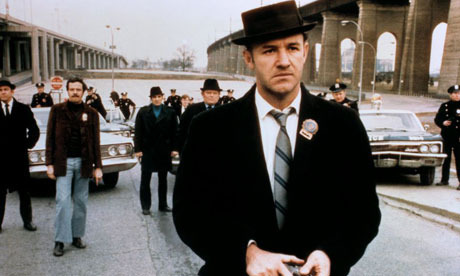 I barely remember seeing The French Connection when I was younger, so watching it today it was like watching a film I hadn't seen. I'll cut right to the chase — the film doesn't hold up and honestly it's pretty dull compared to most of today's crime films. I suppose it was a good police film in 1971, but these days we're saturated with crime drama and frankly the plots of most TV crime shows is far superior to The French Connection. It's hard to believe this film won the Oscar for Best Picture.
I barely remember seeing The French Connection when I was younger, so watching it today it was like watching a film I hadn't seen. I'll cut right to the chase — the film doesn't hold up and honestly it's pretty dull compared to most of today's crime films. I suppose it was a good police film in 1971, but these days we're saturated with crime drama and frankly the plots of most TV crime shows is far superior to The French Connection. It's hard to believe this film won the Oscar for Best Picture.
I did like some things in The French Connection. Gene Hackman's Jimmy "Popeye" Doyle is a memorable character, and Hackman won the Academy Award for Best Actor for his portrayal of the gritty, boozing, racist cop with questionable skills. I also liked the style of the film…it has a definite early 70s mood and the direction caught the period well. But the action was slow and the plot was dull. Truth is Popeye Doyle didn't do good police work to break up the big drug ring, rather he stumbled upon it. Once he was onto it he kept getting "made" by the people he was tailing and not only did he not catch the bad guy in the end he killed one of his own men in the process. Doyle is definitely a flawed character. The film is "loosely" based on a true story, so some of the plot failures may be due to that, but it doesn't work for me.
And then there is the famous car chase. You know it…the one in which Gene Hackman swerves in and out of traffic under the elevated train trying to catch a bad guy. The thing is, it's not a car chase at all. The film is remembered for the amazing car chase that never happened. Yes, he drives fast and almost kills a million other drivers on the road, but he's trying to catch a train not another car. That doesn't qualify as a car chase for me! I'll take the car chase scene in To Live and Die in LA any day!
The French Connection is another film that for me is simply not as good as it is remembered for being. If it were filmed today it would be considered a bad episode of Law and Order.
Next Up: #92 Goodfellas
Filed under: AFI Top 100








May 25, 2011
The Definition of Eclectic: Steppin' Out with Joe Jackson
All of us have a favorite band or musical artist, and more than likely there is a personal story behind why that artist is our favorite. I listen to a ton of music across a wide range of genres, and while certain artists may spend some time in heavy rotation in my collection there is only one artist that qualifies as my favorite — Joe Jackson.
If you're not a fan of Joe Jackson, you may be thinking to yourself "isn't that the guy from the 80s who sang Steppin' Out?" Yep, that's the guy. Like a lot of so-called one-hit wonders, there's a lot more to the story. The truth is, Joe Jackson has been recording consistently amazing music for five decades and his newest album — a collection of reinterpretations of classic Joe Jackson songs from across the decades called Live Music– will be released June 7 in North America. It will be JJ's 29th album all tolled. You can bet I will be downloading it on release day.
[image error]
If you don't know much about Joe Jackson, it's probably because there hasn't been much place for him on commercial radio since the early 80s. He has had six songs chart on the Billboard Hot 100, the first 1979′s Is She Really Going Out With Him? and most recently 1984′s Happy Ending. Chart success in his native U.K. hasn't been much better — he's charted eight times in the U.K. and not once since 1986 (Left of Center with Suzanne Vega). Yet I'd argue that no other artist has a more diverse and wonderful collection of albums. He's a genre buster and mainstream music has little place for an artist that they can't fit neatly into a little box. Just check out what Wikipedia lists for his genre: Punk rock/ska (early), new wave, jazz pop, jazz, and classical music! That is the very definition of eclectic in my mind (I'm still waiting for JJ Sings Nashville Hits)!
I "discovered" Joe Jackson in 1982 with the release of Night & Day, his most mainstream record ever and the album that brought us the aforementioned Steppin' Out along with Breaking Us in Two. I was immediately struck by the jazzy feel and the witty lyrics. It wasn't long before I went back to listen to his earlier work including Look Sharp, I'm the Man and Beat Crazy, an energetic trio of punk-infused pop classics. And then just when I thought I had JJ figured out he released 1984′s Body and Soul, a jazz pop album inspired by Blue Note greats like Sonny Rollins and John Coltrane. You may remember the one hit from that album — You Can't Get What You Want (Till You Know What You Want). I saw Joe Jackson for the first time on that tour at the outdoor amphitheater at San Diego State with Howard Jones, the first of three times I've been fortunate enough to see JJ live.
Over the next several years Joe released a series of great pop albums like Big World, Blaze of Glory and Laughter & Lust, and he threw in a few classical releases as well just to keep his fans on their toes. In 1997 he released Heaven & Hell, a collection of songs based on the seven deadly sins with guest vocalists including Suzanne Vega, Jane Siberry and Brad Roberts from Crash Test Dummies. And then in 2000 he released a sequel to Night & Day called Night & Day II, which has since become my favorite Joe Jackson album. In 2000 he also released Summer in the City: Live in New York, a live CD made up of great takes on his own hits and covers as diverse as The Beatles, Steely Dan and Duke Ellington. His most recent studio release was 2008′s Rain.
I love Joe Jackson for his unique style, his brilliant and edgy lyrics and his musical fearlessness. His lyrics spoke to me as I was growing up. What did it mean to be a man? What was love about? What made life worth living? He wrote songs about politics (Right & Wrong) and songs about sexual desire (Jamie G). He wrote about the difference between men and women (It's Different For Girls) and about recapturing youth (Nineteen Forever). He wrote about longing for home (Hometown) and about chasing your dreams (Go For It). Basically he wrote about the things I was thinking about. He may not have the best vocals of all time, but he can sure write a great song and he can play the piano like nobody's business.
If you like Joe Jackson, then I'm sure you're excited about the new record. If you don't know much about JJ, give him a try. Start with the early punk stuff, move into the jazzier stuff, and then listen in to some of his latest work from the past decade or so. You won't be disappointed! If you need a place to start, take a listen to one of his various greatest hits or live albums. You can find everything you need at www.joejackson.com. And let me know what you think.
Filed under: Music








May 22, 2011
'Inside Job' a Sobering Indictment of Financial Services
"Why should a financial engineer be paid four times to 100 times more than a real engineer? A real engineer build bridges. A financial engineer build dreams. And, you know, when those dreams turn out to be nightmares, other people pay for it." Andrew Sheng, Chief Adviser to the China Banking Regulatory Commission
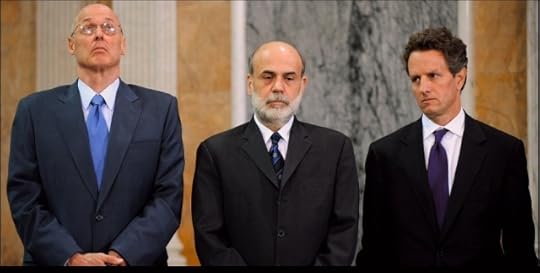 In the late 2000s the U.S. financial system nearly collapsed as a result of a runaway derivatives fueled housing market. While Americans were mostly tuned into American Idol and watching extensive coverage of Paris Hilton on the nightly news, a handful of uber-rich bankers brought America to the edge of financial ruin. You may have heard the bits and pieces about Bear Sterns and Lehman Brothers and AIG going bankrupt, and perhaps you even noticed when the Bush and Obama administrations bailed out these institutions with your money, or maybe even you knew someone who lost their home to foreclosure or had to get out of their home with a short sale, or maybe they just walked away. Yeah, that financial crisis.
In the late 2000s the U.S. financial system nearly collapsed as a result of a runaway derivatives fueled housing market. While Americans were mostly tuned into American Idol and watching extensive coverage of Paris Hilton on the nightly news, a handful of uber-rich bankers brought America to the edge of financial ruin. You may have heard the bits and pieces about Bear Sterns and Lehman Brothers and AIG going bankrupt, and perhaps you even noticed when the Bush and Obama administrations bailed out these institutions with your money, or maybe even you knew someone who lost their home to foreclosure or had to get out of their home with a short sale, or maybe they just walked away. Yeah, that financial crisis.
Inside Job is the Academy Award winning documentary that explains how we got to the point of financial Armageddon and what we did (or didn't do) in response. It's a scary film, especially since the lesson of the film is that we haven't made any substantial changes to our system to protect us from this sort of scam again and nobody (seriously…nobody) has gone to jail or even been indicted for crimes that clearly took place. In fact, those responsible have been summarily rewarded with huge bonuses and cushy jobs in the Obama administration.
Frankly I'm tired of politicians and "conservatives" talking about the merits of laissez faire economics. "The market will take care of itself," they decry and "Government regulation is socialism," they claim falsely. We got into this mess beginning with deregulation of the financial sector beginning in 1980 with Reaganomics and it has gotten worse under every administration since…up to and including the Obama administration. Deregulation and self-monitoring is the problem and the solution is to go back to regulating what the financial services industry can and can't do with our money. And it should start with removing the foxes from the hen house. I thought it was awful when George W. Bush installed coal and oil executives to monitor our environment, but this is worse. Nearly every major player in government with anything to do with monitoring our economy has a history of working with, lobbying for, or even being CEO of the very banks and brokerages that they are supposed to be watching over. It seems the only qualification needed to head the treasury or be chairman of the federal reserve is to have worked for Goldman Sachs.
Perhaps the reason we're so ignorant of what's going on is that these are complicated issues. None of us can hope to fully understand derivatives and credit default swaps. But all you really need to know to understand them is to follow the money…and the money always ends up in the hands of the wealthiest Americans. I'm no conspiracy theorist, but it's hard not to imagine there is some boardroom full of rich old white men laughing their asses off over this whole fiasco. Why should we trust the likes of Geithner, Bernanke and Paulson? And Inside Job even makes the case that we can no longer trust academia as these guys are also financially connected to the Goldman Sachs' of the world.
Inside Job will piss you off — unless of course you are the CEO of Bank of America in which case you'll probably think it's a comedy. This issue should be non-partisan, as even the most conservative of us are still probably not part of the top 1 percent. We're being fleeced and it's only getting worse. What's more, the mainstream media isn't even interested. So far the only decent reporting on the financial meltdown has been by Rolling Stone reporter Matt Taibbi, who for years has been expertly chronicling these crimes. And I have Michael Lewis' book The Big Short on my reading list as well, which is supposed to be a solid explanation of all this.
If the growing disparity between rich and poor in America isn't enough reason for you to re-think your love of Capitalism run amok I'm not sure what is. I for one am not afraid to say I think we need to reconsider our financial system and move toward a more socialist system. Electing more of the same politicians isn't the answer. Anyone else for a revolution?
Filed under: Film








May 21, 2011
AFI #94: Pulp Fiction
The path of the righteous man is beset on all sides by the iniquities of the selfish and the tyranny of evil men. Blessed is he who, in the name of charity and good will, shepherds the weak through the valley of darkness, for he is truly his brother's keeper and the finder of lost children. And I will strike down upon thee with great vengeance and furious anger those who would attempt to poison and destroy My brothers. And you will know My name is the Lord when I lay My vengeance upon thee. – Jules Winnfield
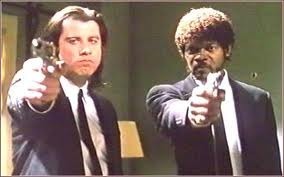 It was 1994 when Quentin Tarantino burst onto the Hollywood landscape with Pulp Fiction, a film that people tend to either love or despise. It probably won't be a surprise to you, my readers, that I think Pulp Fiction is one of the most entertaining films ever to hit the silver screen. I remember sitting there in the theater when it was over and seeing the look on my in-laws' faces and my sister-in-law's as well. They looked like they had just been hit in the face by a brick, and meanwhile Leslie and I were smiling ear to ear in movie bliss. Like I said, you either loved it or you didn't.
It was 1994 when Quentin Tarantino burst onto the Hollywood landscape with Pulp Fiction, a film that people tend to either love or despise. It probably won't be a surprise to you, my readers, that I think Pulp Fiction is one of the most entertaining films ever to hit the silver screen. I remember sitting there in the theater when it was over and seeing the look on my in-laws' faces and my sister-in-law's as well. They looked like they had just been hit in the face by a brick, and meanwhile Leslie and I were smiling ear to ear in movie bliss. Like I said, you either loved it or you didn't.
I don't think there is any question that Tarantino is a sick fucker. Pulp Fiction is just one of his many films that proves he has a warped mind. But to me and his millions of fans he walks the fine line between morbidity and comedy like no other. If you watch Pulp Fiction (and Kill Bill and Reservoir Dogs, etc., etc.) you have to watch with the understanding that the violence and gore is purposely over the top to make you cringe. And then you laugh because it's not realistic — it's pulp fiction.
Pulp Fiction made an impact (and made the AFI list) because it is creative, because it is a true original, and because the writing is pure genius. The banter between Jules and Vincent about everyday topics like cheeseburgers (a Royale with cheese), religion, foot massages and more are epic and movie fans have been quoting them ever since. Here's a gem:
Jules: Oh, man, I will never forgive your ass for this shit. This is some fucked-up repugnant shit.
Vincent: Jules, did you ever hear the philosophy that once a man admits that he's wrong that he is immediately forgiven for all wrongdoings? Have you ever heard that?
Jules: Get the fuck out my face with that shit! The motherfucker that said that shit never had to pick up itty-bitty pieces of skull on account of your dumb ass.
The plot is simply bizarre, from Butch throwing his fight to Mia's overdose to Marsellus and Butch being held hostage by a couple of rejects from Deliverance, to the story of Butch's watch as told by Chris Walken to Tim Roth and Amanda Plummer's ill-fated restaurant robbery…it goes on and on. Classic acting on all fronts. And of course, it shouldn't be forgotten that Pulp Fiction completely re-energized the acting careers of both John Travolta and Bruce Willis.
Pulp Fiction is easily one of my favorite films and re-watching for this project was great. In fact, I may have enjoyed it more than the first few times I saw it because I was paying attention to the details for this review.
Next up: #93 The French Connection
Filed under: AFI Top 100











